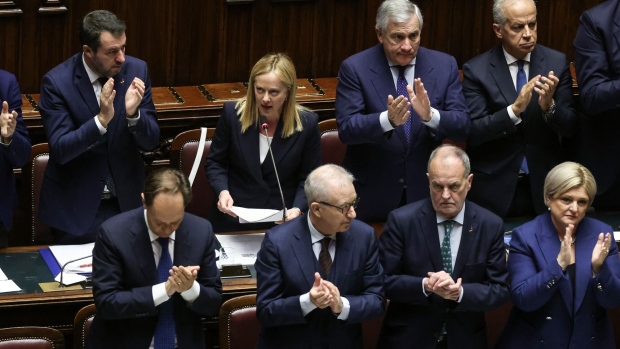Dec 29, 2023
Meloni Secures Italian Budget Sign-Off Overcoming Coalition Buzz
, Bloomberg News

(Bloomberg) -- Italy’s Parliament has given its final approval to Giorgia Meloni’s budget for next year, a win for the government following a string of year-end coalition wrangling over financial policies.
The Lower House passed the budget law late Friday, endorsing a high-wire balancing act which finances some promises to voters but also pledges to keep the country’s deficit under control.
The approval with a resounding majority shows coalition unity after days of tension within Meloni’s three-party majority after the Parliament’s decision not to ratify the reform of a European Union bailout fund, and on the extension of a controversial tax-credit scheme for home renovation.
The budget lowers taxes on wages and reduces the number of income brackets subject to them. Contracts for state employees will also be renewed.
Year-Ahead
Meloni will enter 2024 having escaped the threat of a downgrade to junk, and with the spread between German and Italian bond yields — a key measure of risk in the euro region — close to the lowest level since she took office.
Along the way, Italy has avoided censure from the European Commission for loosening its fiscal stance, even as extra spending meant that its deficit as a percentage of gross domestic product won’t fall below the European Union’s limit until 2026 — a year later than planned.
That approach reflected Meloni’s insistence on meeting campaign pledges despite the economy growing less than than expected. In contrast, her 2022 budget benefited from a €9 billion ($9.9 billion) windfall derived from its strong performance under her predecessor, Mario Draghi.
The risk she ran this year was all the greater amid intense scrutiny on Italy’s public finances. The country faced the danger of losing its investment-grade status until Moody’s Investors Service removed its negative outlook. Rivals also kept their own higher ratings unchanged.
The government now has some breathing space to push ahead with part of its economic program and help Meloni consolidate power within her fractious governing coalition.
Things may not be so easy in future as new EU fiscal rules agreed earlier this month set in, in time for the pandemic-era suspension on its Stability and Growth Pact to end in 2024.
The new criteria call for countries with debt over 90% of output to trim it by 1 percentage point of GDP during an adjustment period. Italy’s own ratio is around 140%, and an anemic economy paired with rising debt-servicing costs may make that hard to trim.
Still, Finance Minister Giancarlo Giorgetti said earlier this week that Italy won’t need to change its budget plans for next year to meet the new rules.
--With assistance from Aline Oyamada, Antonio Vanuzzo and Daniele Lepido.
©2023 Bloomberg L.P.






